“Vous qui passez sans me voir”
“You who pass by without seeing me”
Pierre MANUEL
Presentation of the project:
This biography was written by 9th grade students from the Charlemagne middle school in Bruyères, in the Vosges department of France, during the school year 2018-2019 as part of the work of the Convoi 77 association, whose objective is “to better understand and make known the destinies of the 1310 men, women and children who, on July 31, 1944, left Drancy for Auschwitz in cattle cars”.
Our students, apprentice historians, thus followed in the footsteps of Pierre Manuel, born in Epinal, and deported to Auschwitz on July 31, 1944. They worked from digitized archives, research carried out on the Internet and with memorial associations. They also drew on information from well-known witnesses such as Primo Levi and Simone Veil and looked for Pierre’s “fingerprints” in Epinal, his home town. Some of these searches proved unsuccessful, such as those carried out in the Archives of the textile school in Epinal, and the Fresnes and Auschwitz archives.
First of all, they gathered together the fragments of the life of Pierre Manuel, who died in anonymity and with no direct descendants. They believed they were working on the unremarkable life of one man among millions murdered during the destruction of the Jews of Europe. However, they were amazed to find a member of the FFL (Forces France Libres – Free French forces) and the FFC (Forces Françaises Combattantes – Free French Combattants ) whose brother was one of the founders of the BCRA (Bureau Central de Renseignements et d’Action – Central Office of Information and Action), and an assistant in London to Colonel Passy and General De Gaulle.
A lucky find during an internet search, a book called Les plages de Trouville, by Carole Achache, a great-niece of Pierre Manuel, tells the story of the Manuel family. This family-oriented novel provided an opportunity to learn about other important elements of his life. However, Carole Achache is no longer alive and her children did not wish to grant access to the family archives on which the novel is based (photos, private correspondence, etc.).
Once the biographical material had been collated, the writing could begin. The students organized themselves into work groups.
Each stage of Pierre Manuel’s life (birth, youth, joining the Resistance, passing through London, arrest and deportation) was recorded by a group who added drawings, period postcards, photos, archive extracts, etc. Under the guidance of their teachers, the pupils were inspired by Ivan Jablonka’s method in which, in the absence of direct sources, he used similar sources (witness statements, comparable archives etc.) to put forward the most plausible hypotheses concerning the disappearance of his grandparents.
The format of their work, in the form of files and old papers, is intended to symbolize both the work of the teams in the various archives and the fact that Pierre Manuel’s fate was revealed to them little by little, fragment by fragment. Similarly, the increasingly sparse last pages evoke his disappearance without a trace in the almost industrial killing facilities.
Our students, budding historians, became passionate about this work. They invested a great deal of time and effort in the research, which they viewed as a quest. They became caught up in, some of them almost haunted by, the singular and tragic destiny of Pierre Manuel. The poem, included in the introduction, bears witness to this. Their sensitive understanding of the subject and their emotion was tangible.
Finally, to expand on the project, we contacted the Association that manages the Jewish cemetery and the “Monument in memory of the Jewish victims of Nazi barbarism” in Epinal. The members of the association were very interested in this biography and suggested that Pierre Manuel’s name be added to the list of Jewish victims on the monument at a ceremony, in which our students will be involved in the spring of 2020.
Through this work, therefore, they have brought the existence of Peter Manuel back from oblivion and have contributed to the passing on of the memory of the Shoah.
Emmanuelle Démont and Grégoire Chauvin.
“Auschwitz – Convoi 77”
The destiny of a child of Epinal
Biography of Pierre MANUEL, illustrated, to begin with, by a poem written by Lou Bernhard in 2019
Lou Bernhard’s poem, 2019
Me, born into a bourgeois family in the northeast…
1908, I set off on a life that’s a little out of the ordinary…
Jewish parents, my brother and my sister as my only cocoon…
My father, manager of the Epinal textile factory.
In the early 20s, it’s off to school.
Textile school. Like my brother before me; you can’t escape your destiny…
But for me, after my baccalaueate, I head for London, with the idea of becoming a stockbroker in mind.
1936 I hit the road for Paris,
New home for a new life
My parents, my brother and my sister are joining me…
It’s the end of the family business…
Spring ’40. My destiny is overtaken by history.
My year flies by as a soldier.
Very soon I’m behind bars: the French lose the fight.
January ’41 I’m released from my cell.
I think the French miscalculated.
Toulouse, the city of the great decision
Well hidden, well protected, I join in the rebellion.
André, my elder brother, always rising higher and higher.
The BCRA, not yet for me, we’ll see if de Gaulle is nice.
Brotherhood of Our Lady of Colonel Remy
Not on the same level, but the Manuel brothers are reunited.
Offences against the security of the State, that’s the motive for my action
Everyone is entitled to their own opinion
But for me it’s “Down with the Vichy regime”.
From November ’41 to May ’43 I move from hideout to hideout, from collaborator to collaborator.
I’m tired of this, it’s one time too many.
It’s time to disappear
I’m off to say hello to the English
Lost in the middle of these tea drinkers
But every word I say, they think it worthless.
But then each of my ideas, every one of my suggestions
Is accepted without question
“You who pass by without seeing me”
It’s my cover, it makes me drunk with hope.
At the end of January ’44 it is my turn to be parachuted in.
Each to his own mission, mine is to lead the BOAD.
Pic, thanks for your welcome
But I’m not my brother, and I’m not the one to blame.
Several weeks go by
Too many meetings, but I keep my head above water,
Until the day it all becomes too much for me.
March 19, 1944, 6 p.m.
Georgette and I are walking to the meeting, we’re always on time.
All it takes is a street, a path, a train, a subway
For us to come face to face with the Gestapo.
She had to be with me that night
It’s beyond my power, I’m sorry, guys.
But I can’t right now.
Wrong time, wrong place, wrong person…
And I think I can already feel your hatred, it weighs a ton.
Every time I talk, I hear your screams in my head.
But every one of those words frees Georgette a little bit more
The Gestapo are coming your way.
Your whole world is falling apart.
I know I betrayed you.
But it’s not just for a real bed
Three months in Fresnes is as long as a day without bread
But Fresnes is nothing compared to the 21 days in Drancy
So far the worst time of my life
I’ll spare you the details
But you should know that my bed was soon replaced by straw
1944, July, the 31st
It’s time for my final destiny
Three days long to die
But I had the will to survive
Finally I’m on the platform, there’s no way to continue…
Now it’s a total blur, for me, for you…
Am I dead or did I win against those lunatics?
Even though my life story looks like a black hole…
Remember me, “You who pass by without seeing me”.
Lou Bernhard, 2019.
September 13, 1908, rue de la Manutention[1] at Epinal.
A boy or a girl?
It’s a boy. It’s 11 p.m.
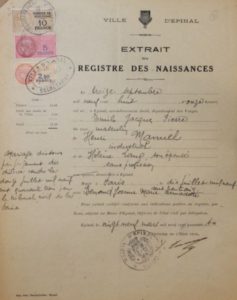
Pierre Manuel’s birth certificate,
Épinal Municipal Archives
He was called Pierre; Pierre Emile Jacques MANUEL. His family soon nicknamed him Micky. No one knew where that nickname came from. He was circumcised at birth by the Rabbi of Épinal.
He was the son of Manuel Manassé and Helene Lang, the youngest of three siblings, André, born on June 1, 1905 and Lucienne, born December 11, 1903. Henri Manuel, his father, was the manager and co-owner of the textile businesses Kahn, Lang and Manuel. Pierre was thus born into the Épinal bourgeoisie.
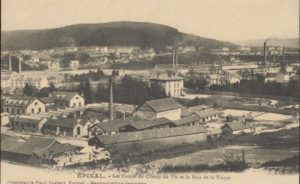
Postcard of the Kahn and Lang factory in Épinal – bmi Épinal, CP 1004 P/R
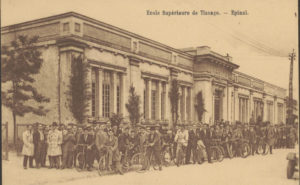
Postcard of the textile school – bmi Épinal CP 1829 P/R
It was beginning of the 1920s and time to go back to school. Perhaps Pierre was a little nervous about going to the textile school in Épinal. Textiles of course, like his brother before him; one can never escape one’s family. The school archives include no record of Pierre. All we know is that he passed his baccalaureate and then joined the family business.
How did he end up as an insurance broker in London in the years that followed? There are no sources to explain this. We just know that he acquired a perfect command of English.
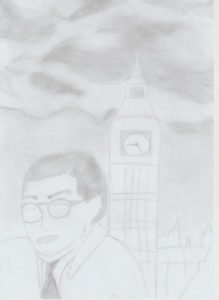
Pierre Manuel in Londres, by Lou Bernhard
He returned to France to witness the demise of the Kahn, Lang and Manuel d’Épinal factory in 1936 and a few months later settled with the rest of his family in Paris. The financial setback at Épinal did not, however, mean that the family was ruined, since the Manuels moved to the heart of the 16th district of the city.
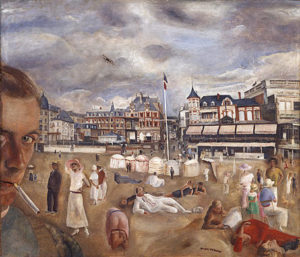
“La plage de Trouville” (Trouville Beach) is a painting by Jacques Mauny from 1922. This painting was hung in the bedroom of the Manuel-Lang mansion in the 16th district. It was stolen by the Nazis and eventually returned to the dispossessed heirs in 1999. Image courtesy of Telerama.
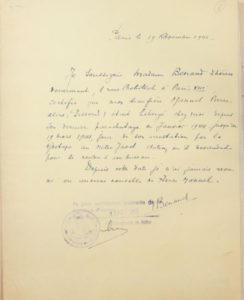
Document obtained from Pierre Manuel’s dossier at the Department of Veterans Affairs and War Victims – cote 21 P 560 11
It was probably in Paris that Pierre met Yvonne, known as Yvette, Berraud. They were married on July 10,1935.
Spring 1940. The destiny of the Manuel family, like that of all French citizens, was overtaken by history.
The German offensive put an end to the phony war. When the mass call up required all able-bodied men to join the combat….
Pierre Manuel joined the army.
In July 1940 the thirty-year-old was imprisoned in La Rochelle with other soldiers in the context of the defeat. Following the armistice, along with thousands of other soldiers, he was freed and returned to civilian life in January 1941.
He returned to his family who had taken refuge in Toulouse and found work in a sugar distribution company. This served primarily as a cover for his involvement in the Resistance.
While his brother André responded to General de Gaulle’s request by going to London in July 1940 [2], Pierre, for his part, joined Colonel Rémy’s Notre-Dame Brotherhood network in January 1941. This intelligence network, which received its orders directly from the Bureau Central de Renseignement et d’Action, or Central Bureau of Intelligence and Operations (BCRA), was one of the most important of the French Resistance. Everything leads us to believe that despite their distance and covert activities, the two brothers remained in touch, since André was involved in founding the BCRA.
On November 23, 1941,
the young resistance fighter was arrested for “undermining the security of the State”, presumably by the Vichy police. He thus tried to hide his Jewishness in order to protect himself and his family.
Pierre then spent time in prison camps at Toulouse, Moissac-Bergerac and finally Périgueux, from which he escaped, along with nine of his fellow detainees, on May 5, 1943.
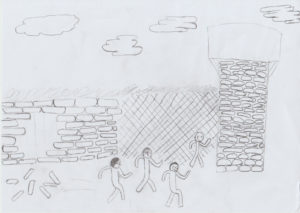
The escape. Drawing by Mattéo Gambino
We catch up with him again a month later in Paris, where he divorced his wife Yvonne. Now too well known to the authorities of Vichy and the Occupying Forces, was he trying to protect her by doing this?
On August 22 he set off alone for London. The archives include no indication of the route he took to join the Free French.
He joined the Free French Forces (FFL) on August 22, 1943 and underwent a “training course”. The reports made by his instructor and his commander after a few weeks of training were catastrophic: they note that Pierre “over-thinks”, “lackes initiative” and “doesn’t know how to do anything with his hands”. Two weeks later, however, his appraisals were much improved, this time describing him as a man who “looks good”, was “likeable”, “generous”, and with “considerable courage”. During this time he adopted the nicknames “Doyen” and “Pessard” and chose as his password “Vous qui passez sans me voir” – “You who pass by without seeing me“[3].
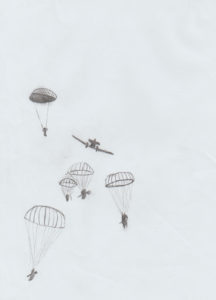
“Parachuting” Drawing by Simon Pereira
On January 28, 1944, Pierre was parachuted into the Côte-d’Or area with a mission to lead the BOAD (Bureau des opérations aériennes région de Dijon – Bureau of Air Operations of the Dijon region). Michel Pichard, alias “Pic”, was in charge of Pierre’s arrival and installation. Picard was one of the managers of the BOA of France. His opinion of Pierre was very negative; he seemed “unqualified” and clearly implied that he had only been appointed to this position owing to that of his brother [4] .
“Doyen” was to lead the BOAD in Paris. He stayed with his sister-in-law, Thérèse Berraud, at 1 rue Bobillot in the 13th district.
During the night of March 19, 1944, at 6 p.m., Pierre and Georgette, his secretary, were arrested
at the Javel metro station, when they were on their way to meet with Michel Pichard and other members of the BOA. A few hours later, some other members of the network were also arrested. Little by little, almost the entire network fell into the hands of the Gestapo.
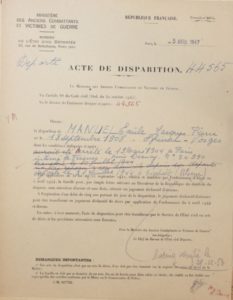
Document from the Pierre Manuel’s dossier at the Department of Veterans Affairs and War Victims – cote 21 P 560 117
On March 23, Georgette was released and told “Pic” about the events following their arrest. According to her, Pierre had turned in the entire network to the Gestapo so that she would be spared.
Pierre was incarcerated in Fresnes prison on March 23rd, the same day that Georgette was released. Michel Pichard’s book about that period include serious accusations against Pierre who, according to his fellow prisoners, had better prison conditions, such as access to cigarettes and, above all, he bore no visible signs of torture after having been in the hands of the Gestapo. Even more damning, according to the testimony of the resistance fighter “Palaud”, Pierre went to a meeting on the Alma bridge, escorted by the Gestapo, without making the warning sign intended for use in such circumstances. It should be noted, however, that Mr. Pichard’s work l’Espoir des ténèbres” – “Hope in the Darkness” is written in a romantic style, does not cite its sources and relied on his memories alone.
Pierre awaited his fate in Fresnes prison, where he was held for over three months.
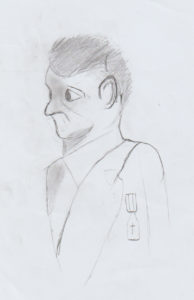
« Michel Pichard ». Drawing by Simon Pereira
On July 10, 1944, he was transferred to Drancy at the same time as Paul Stern [5]. He stayed there for 21 days. “The living conditions in the camp were morally challenging. Materially, they were also very harsh. We slept badly, we ate badly,” explains Simone Veil [6] who experienced life in Drancy around the same time. Pierre was probably therefore subjected to the same conditions. Was he also hoping, as were others, for the imminent arrival of the Americans, who had landed in Normandy in June?
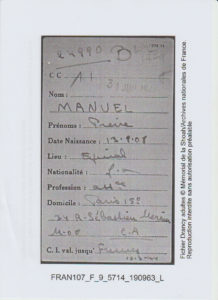
Record of Pierre Manuel’s internment at Drancy
On July 31, 1944, Pierre and the 1309 other deportees of convoy 77 were taken to Bobigny train station by bus where they were loaded into cattle cars headed towards Auschwitz.
One can only imagine the terrible and inhumane conditions of this journey at the end of July. The deportees were crammed into hot, sealed wagons for more than three days “without eating or drinking, without being able to lie down, with only a bucket to share as a toilet”.
The convoy arrived at the ramp at Auschwitz-Birkenau on 3 August. From that moment on, Pierre disappeared without leaving any evidence for historians.
Was he one of the 836 people who were sent directly to the gas chambers of the Krematoriums?
Considering his age, 36 years old, and his physical condition, one could reasonably believe that he was sent to the labour camp and suffered the humiliation of being tattooed. There is, however, no evidence to support such an assumption.
Did he die of exhaustion? If he survived those tragic conditions, did he live through the “death marches” during the evacuation from Auschwitz?
And even if Mr. Pichard claims, with no evidence, that “a former resistance fighter might have met him, several years later, in Colombia”, we are faced with an absence of sources.
All we can do now is to speculate, as Ivan Jablonka does when he talks about the death of his grandparents:
“One can imagine everything: murder, typhus, exhaustion, suicide, a failed escape, but in truth his life and my story have no end; Matès ceases to be, his life unravelling like the shreds of a corpse that mingles with the earth in the mass graves, his existence leaving the world. In truth, there is no truth, no place, no reality, merely a no man’s land between life and non-life, a sudden absence, an evaporation of which one only becomes aware once peace has returned […]
Was he killed, yes or no? […]
Did he go to his death with open eyes?”
Tomb of the Manuel-Lang family at the Israélite Cemetary at Épinal
[1] Rue Abel Ferry today
[2] André Manuel was one of the founding members of BCRA (Bureau Central de Renseignement et d’Action – Central Bureau of Intelligence and Action) along with André Dewavrin alias “Colonel Passy”. Pierre’s brother was therefore one of the most senior officials of the Free French Forces, a close collaborator of Charles de Gaulle, and until the end of his career he was in charge of the French counter-espionage services.
[3] Carole Achache, La plage de Trouville, Stock, 2008.
[4] Michel Pichard, L’espoir des ténèbres : parachutages sous l’Occupation, histoire du BOA, ERTI, 1990.
[5] See the biography of Paul Stern on the Convoi 77 association website.
[6] Simone Veil, Une vie, Livre de poche, 2010
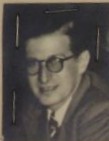
37884-MANUEL-Emile-Jacques-Pierre-21P-560-11737884_DAVCC_copyright_13692-1024×683
Acte de naissance
Pierre MANUEL_Carte Postale usine Khan et Lang
B_881606401_cp_000001829_h
Pierre Manuel Londres par Lou Bernhard
Pierre MANUEL_dernier-proprietaire-connu,M19263
37884-MANUEL-Emile-Jacques-Pierre-21P-560-11737884_DAVCC_copyright_13685-1024×683
Pierre MANUEL ordre mobilisation generale
Pierre MANUEL Evasion par Matteo Gambino
Pierre MANUEL Parachutage par Simon Pereira
37884-MANUEL-Emile-Jacques-Pierre-21P-560-11737884_DAVCC_copyright_13687-1024×683
Pierre MANUEL Michel Pichard par Simon Pereira
Fiche Drancy-Pierre-Manuel
Contributor(s)
The 9th grade students of the Collège Charlemagne middle school in Bruyères, in the Vosges department of France, during the school year 2018-2019, under the guidance of their teachers, Mme Emmanuelle Demont and Mr Grégoire Chauvin
References
Bibliography
ALBERTELLI, Sébastien, Les services secrets du général de Gaulle. Le BCRA 1940-1944, Perrin, 2009.
JABLONKA, Ivan, Histoire des grands-parents que je n’ai pas eus, Seuil, 2012.
LEVI, Primo, Si c’est un homme, trad. M.Schruoffeneger, Julliard, 1987.
MENDELSOHN, Daniel, Les disparus, trad. P.Guglielmina, Flammarion, 2007.
MODIANO, Patrick, Dora Bruder, Gallimard, 1997.
VEIL, Simone, Une vie, Stock, 2007. Sources et bibliographie citées
ACHACHE, Carole, La Plage de Trouville, Stock, 2008.
PICHARD, Michel, L’espoir des ténèbres. Parachutages sous l’Occupation, ERTI, 1990.
Municipal Archives of Epinal – Birth certificate
Ministry of Defence Historical Service – administrative file of resistance fighter: Pierre MANUEL (16P295540)
Ministry of Defence Historical Service – administrative file of resistance fighter: André Manuel (16P390333)
Ministry of Defence Historical Service – Pôle des Archives des Victimes des Conflits Contemporains (Archives of Victims of Contemporary Conflicts) – Pierre Manuel’s dossier (21P560117)
Drancy Files – Adults, Shoah Memorial/French National Archives – Cote FRAN107_F_9_5714_190963_L
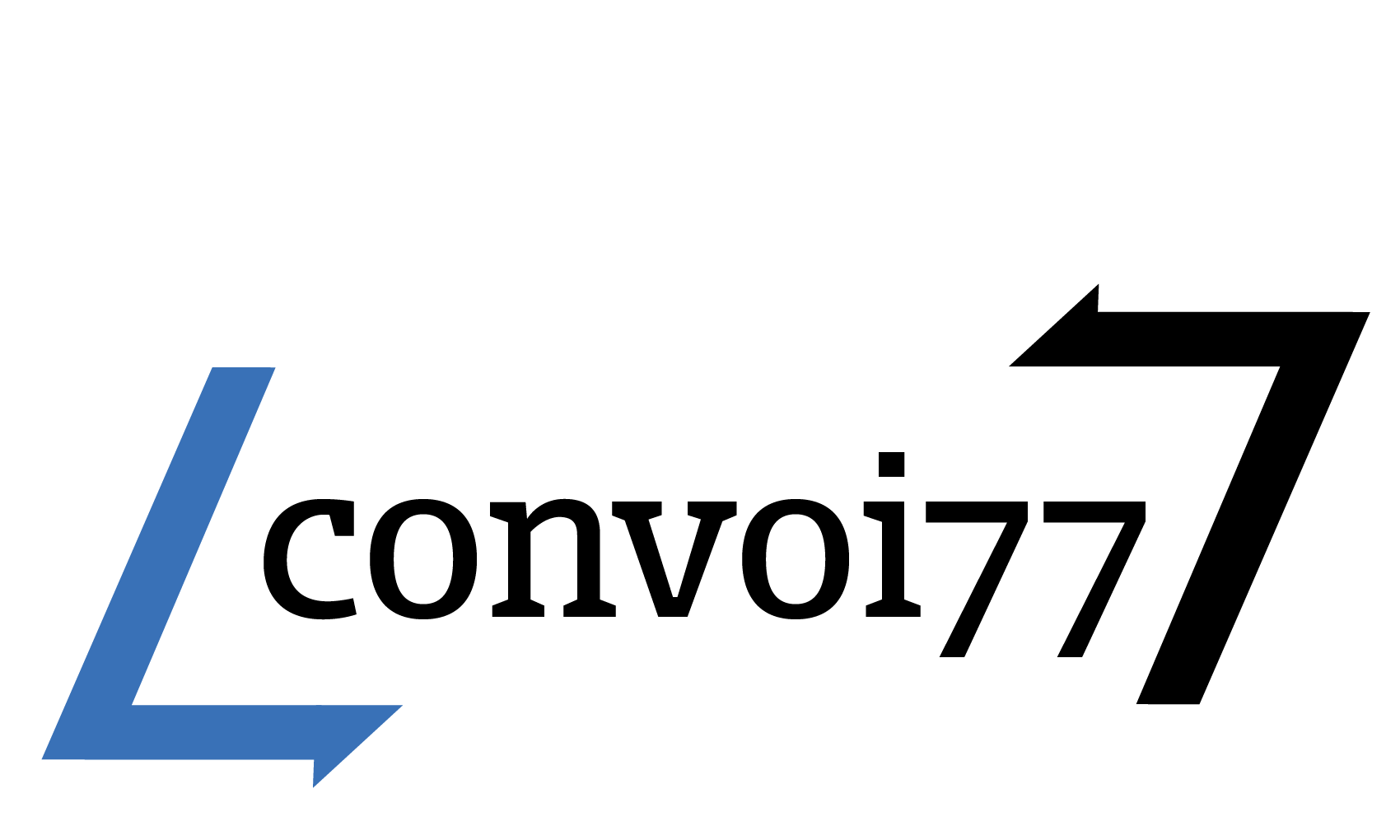

 Français
Français Polski
Polski











Quel travail!! vous avez su redonner vie à cet homme dont on ne sait rien des derniers jours et dernières heures.
Lou a su trouver les mots justes pour son SLAM, c’est une artiste en herbes.
Bravo aux élèves et à leurs professeurs
C’est tres emouvant pour moi. Andre Manuel est (etait) mon pere.
Il n’a jamais vraiment parle de son frere Pierre.
Mes felicitations pour toiut votre travail.
GM
Un grand bravo et un grand merci aux élèves et aux professeurs pour ce travail de mémoire !
La présentation est parfaite.
Bonne continuation à vous tous.
AB